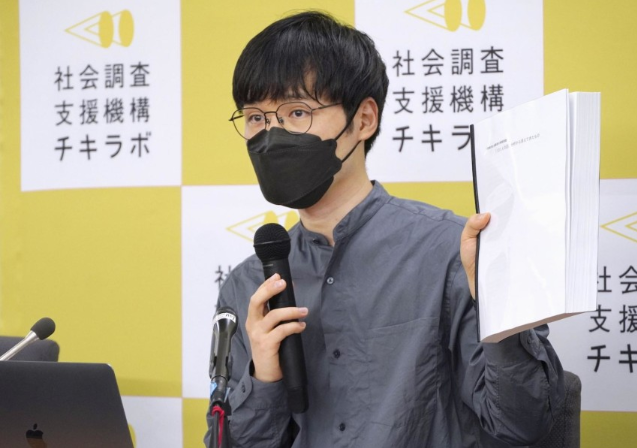A recent survey of the children of followers of religious groups has found strong support for establishing a mechanism for them to "escape" both their parents and the groups if they are troubled by the group's activities.
Social Research Action Chiki Lab said 73.0 percent of respondents to its survey of so-called "second-generation" members of religious organizations -- children who have also been enrolled in their parents' religious organizations -- replied in the affirmative when asked if such a system should be introduced.
The respondents included the children of followers of the controversial Unification Church, which has come under public scrutiny over its links with Japan's ruling Liberal Democratic Party and the financially ruinous donations made by members.
The survey also found that 71.9 percent of respondents agreed that religious groups that cause problems in society should be disbanded or stripped of their status as a religious corporation entitled to tax benefits.
In addition, 67.3 percent want legislation to designate certain groups as a "cult" and subject them to regulations to prevent abuses under the name of religion.
Chiki Ogiue, who led the survey, said some religious groups have a culture of tolerating physical punishment and encouraging donations, and that the concerns expressed by second-generation followers are "not rare."
Ogiue expressed hope the survey will encourage religious groups to review practices that may infringe human rights and that the government will look into the situation of second-generation followers.
The web-based survey was conducted in September using the "snowball sampling" method, in which survey form was disseminated by respondents to reach more respondents. It received 1,131 valid answers.
Among the respondents were 428 children of followers of Soka Gakkai, Japan's largest lay Buddhist group and a strong support base of the LDP's junior coalition partner Komeito, while 168 came from the Jehovah's Witnesses, a U.S.-based Christian denomination.
The respondents also included 47 from the Unification Church, founded by a staunch anti-communist in South Korea in 1954.
Scrutiny of the Unification Church intensified following the fatal shooting of former Prime Minister Shinzo Abe in July. His attacker, Tetsuya Yamagami, has said he held a grudge against the Unification Church because his mother made considerable donations to the group, leaving his family in financial ruin.
More than 30 percent of the survey respondents said they were urged by their religious affiliations to attend election campaign rallies and solicit votes for certain candidates, while over 20 percent said they were urged to do so by their parents.
Revelations of connections between LDP members and the Unification Church have raised fears that the religious group may have sought to exert political influence through the party.
Among those who left their religious groups, 58.3 percent said they had a bad relationship with their family and 45.9 percent said they struggled to assimilate into society due to religious values that remained even after leaving the groups.
Of the respondents who identified themselves as second-generation followers of the Unification Church, 70.2 percent said they have been urged by the group many times or occasionally to make donations.






